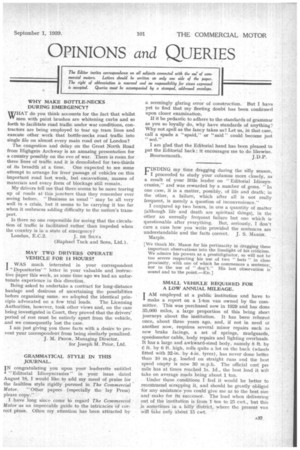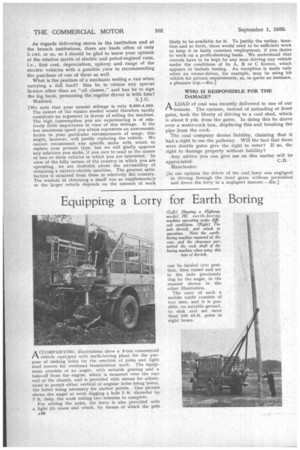OPINIONS and QUERIES
Page 39

Page 40

If you've noticed an error in this article please click here to report it so we can fix it.
The Editor invites correspondence on all subjects connected with the use" of com
mercial motors. Letters should be written on only one side of the paper. The right of abbreviation is reserved and no responsibility for views expressed
is accepted. Queries must be accompanied by a stamped, addressed envelope.
WHY MAKE BOTTLE-NECKS DURING EMERGENCY?
WHAT do you think accounts for the fact that whilst VT men with paint brushes are whitening curbs and so forth to facilitate road traffic under war conditions, contractors are being employed to tear up tram lines and execute other work that bottle-necks road traffic into single file on almost every main road out of London?
The congestion and delay on the Great North Road from Highgate Archway is an amazing presentation for a country possibly on the eve of war. There is room for three lines of traffic and it is demolished for two-thirds of its breadth at a time. One expected to see some attempt to arrange for freer passage of vehicles on this important road last week, but excavations, masses of materials and every form of blockage still remain.
My drivers tell me that there seems to be more tearing up of roads at this juncture than they remember ever seeing before. "Business as usual" may be all very well in a crisis, but it seems to be carrying it too far when it embraces adding difficulty to the nation's trans
port
Is there no one responsible for seeing that the circulation of traffic is facilitated rather, than impeded when the country is in a state of emergency?
London, E . C . 2. J. DE SILVA (Raphael Tuck and Sons, Ltd.).
MAY TWO DRIVERS OPERATE VEHICLE FOR 14 HOURS?
IWAS much interested in your correspondent WAS " letter in your valuable and instructive paper this week, as some time ago we had an unfortunate experience in this direction.
Being asked to undertake a contract for long-distance haulage and desirous of ascertaining the possibilities before organizing same. we adopted the identical prin ciple advocated on a few trial loads. The Licensing Authorities, however, took other views and, on the case being investigated in Court, they proved that the drivers' period of rest must be entirely apart from the vehicle, and we consequently lost the case.
I am just giving you these facts with a desire to prevent your correspondent from being similarly penalized. J. M. PRIOR, Managing Director, " for Joseph M. Prior, Ltd.
GRAMMATICAL STYLE IN THIS JOURNAL.
IN congratulating you upon your leaderette entitled "Editorial Idiosyncrasies" in your issue dated August 18, I would like to add my meed of praise for the faultless style rigidly pursued in The Commercial Motor. "Other papers (especially the lay Press) please copy."
I have long since come to regard The Commercial Motor as an impeccable guide to the intricacies of correct prose. Often my attention has been attracted by
a seemingly glaring error of construction. But I have yet to find that my fleeting doubt has been confirmed upon closer examination.
If it be pedantic to adhere to the standards of grammar as you so loyally do, why have standards of anything*: Why not spell as the fancy takes us? Let us, in that case, call a spade a "spaid," or 'said" could become just " sed."
I am glad that the Editorial hand has been pleased to pat the Editorial back : it encourages me to do likewise.
Bournemouth. J.D.P.
FINDING my time dragging during the silly season, I proceeded to study your columns more closely, as a result of your little leader on "Editorial Idiosyncrasies," and was rewarded by a number of gems. "In one case, it is a matter, possibly, of life and death; in the other, a failure, which after all is not really frequent, is merely a question of inconvenience."
I conjured up two boxes, in one a quantity of matter (although life and death are spiritual things), in the other an unreally frequent failure but one which is questionable after everything. But, seriously, I don't care a cuss how you write provided the sentences are understandable and the facts correct. J. S. MASON.
Marple.
[We thank Mr. Mason for his pertinacity in dragging these important observations into the limelight of his criticism. We admire his powers as a prestidigitator, so will not he too severe respecting his use of two " buts " in close proximity, with one of which he commences a sentence;, nor to the use of " don't." His last observation is sound and to the point.—En.] SMALL VEHICLE REQUIRED FOR A LOW ANNUAL MILEAGE.
I AM employed at a public institution and have to I make a report on a 1-ton van owned by the committee. This was purchased new in 1929 and has done 35,000 miles, a large proportion of this being short journeys about the institution. It has been rebored once, about three years ago, and, if not in need ot another now, requires several minor repairs such as new brake facings, a set of springs, mudguards, speedometer cable, body repairs and lighting overhauls. It has a large and awkward-sized body, namely 8 ft. by 0 ft. by 6 ft. high, rolls quite a lot on the back (wheels fitted with 32-in. by 4-in. tyres), has never done better than 10 m.p.g. loaded on straight runs and the best speed empty is now 30 m.p.h. The official cost per nile has at times reached is. ld., the best load it will take on average roads being about 1 ton.
Under these conditions I feel it would be better to recommend scrapping it, and should be greatly obliged for any assistance you could 'give me as to the best size and make for its successor. The load when delivering out of the institution is from 1 ton to 25 c.1., but this is sometimes in a hilly district, where the present van will take Only" about 15 cwt.
As regards delivering stores in the institution and at the branch institutions, there are loads often of only 5 cwt. or so, so I should be glad to know your opinion Of the relative merits of electric and petrol-engined vans, i.e., first cost, depreciation, upkeep and range of the electric vehicles with a possible yiew to recommending the purchase of one of these as well.
What is the position of a mechanic testing a van when carrying a full load? Has he to 'obtain any special licence other than an "all classes," and has he to sign the log book, presuming the regular driver is with him?
Watford. S. J .G.
[We note that your annual mileage is only 3,000-4,000. The extent of the repairs needed would therefore hardly constitute an argument in favour of selling the machine. The high consumption you are experiencing is of relatively little importance in view of this Mileage. If the low maximum speed you attain represents an uneconomic factor in your particular circumstances of usage, this might, however, well justify replacing the vehicle. We cannot recommend any specific make with which to replace your present type, but we will gladly approve any selection you make, if you care to send us the names of two or three vehicles in which you are interested. In view of the hilly 'nature of the country in which you are operating, we are doubtful about the advisability of obtaining a battery-electric machine, The greatest satisfaction is obtained from these in relatively fiat country. The wisdom of obtaining a small van as supplementary to the larger vehicle depends on the amount of work likely to be available for it. To justify the outlay, taxation and so forth, there would need to be sufficient work to keep it in fairly constant employment, if you desire to work on a profit-showing basis. We understand that records have to be kept by any man driving any vehicle under the conditions of its A, B or C licence, which appears to include testing. An exception is made only when an owner-driver, for example, may be using his vehicle for private requirements, as, to quote an instance, a pleasure trip.—ED.]
WHO IS RESPONSIBLE FOR THE DAMAGE?
A LOAD of coal was recently delivered to one of our (-I tenants. The carman, instead of unloading at front gates, took the liberty of driving to a coal shed, which is about 6 yds. from the gates. In doing this he drove over a water-cock box, displacing this and breaking the pipe from the cock.
The coal company denies liability, claiming that it had a right to use the pathway. Will the fact that there were double gates give the right to enter? If so, the right to damage property without liability?
Any advice you can give me on this matter will be appreciated. C.B. Manchester.
[In our opinion the driver of the coal lorry was negligent in driving through the front gates without permission and drove the lorry in a negligent manner.--ED.]




































































